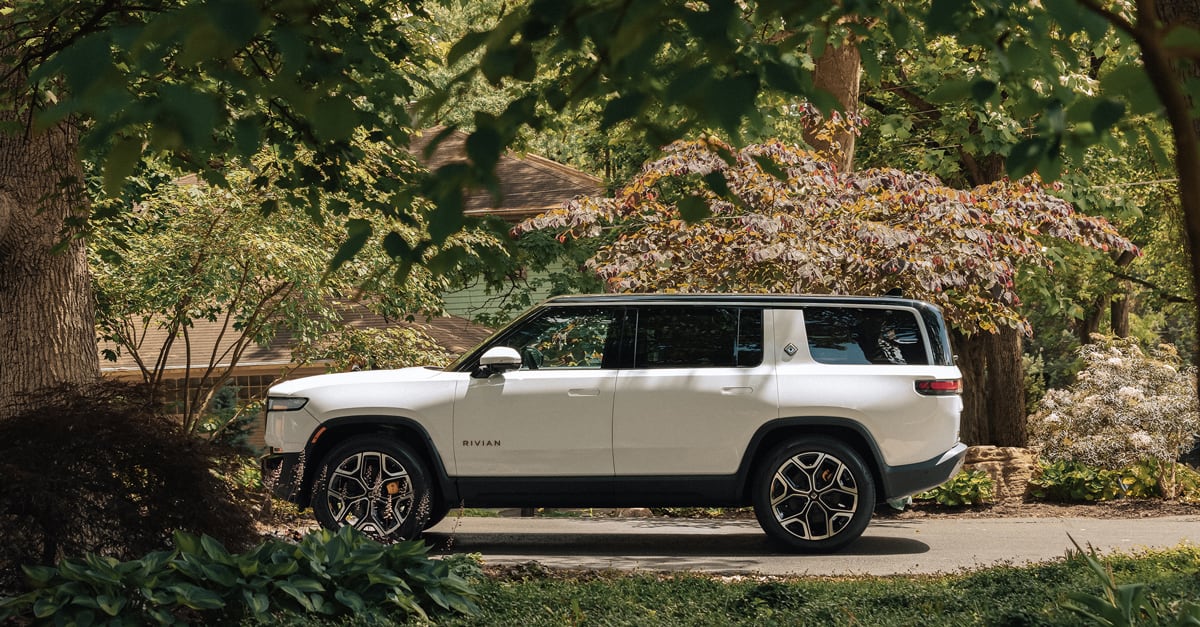That is a true statement but I don’t think helpful in this context. The many plug-in hybrids sold today are parallel hybrids, calling the Harvester a plug-in hybrid while literally true risks causing confusion. The parallel/series distinction is the important one. BTW, there is a plug-in version of the Prius.Technically it could be lumped in under 'Plug-in Hybrid' (PHEV) because it has a plug whereas a traditional hybrid (like the Prius) cannot be plugged-in but whatever.
Switching Harvester to All EV Model?
- Thread starter BearScout
- Start date
-
 From all of us at Scout Motors, welcome to the Scout Community! We created this community to provide Scout vehicle owners, enthusiasts, and curiosity seekers with a place to engage in discussion, suggestions, stories, and connections. Supportive communities are sometimes hard to find, but we're determined to turn this into one.
From all of us at Scout Motors, welcome to the Scout Community! We created this community to provide Scout vehicle owners, enthusiasts, and curiosity seekers with a place to engage in discussion, suggestions, stories, and connections. Supportive communities are sometimes hard to find, but we're determined to turn this into one.
Additionally, Scout Motors wants to hear your feedback and speak directly to the rabid community of owners as unique as America. We'll use the Scout Community to deliver news and information on events and launch updates directly to the group. Although the start of production is anticipated in 2026, many new developments and milestones will occur in the interim. We plan to share them with you on this site and look for your feedback and suggestions.
How will the Scout Community be run? Think of it this way: this place is your favorite local hangout. We want you to enjoy the atmosphere, talk to people who share similar interests, request and receive advice, and generally have an enjoyable time. The Scout Community should be a highlight of your day. We want you to tell stories, share photos, spread your knowledge, and tell us how Scout can deliver great products and experiences. Along the way, Scout Motors will share our journey to production with you.
Scout is all about respect. We respect our heritage. We respect the land and outdoors. We respect each other. Every person should feel safe, included, and welcomed in the Scout Community. Being kind and courteous to the other forum members is non-negotiable. Friendly debates are welcomed and often produce great outcomes, but we don't want things to get too rowdy. Please take a moment to consider what you post, especially if you think it may insult others. We'll do our best to encourage friendly discourse and to keep the discussions flowing.
So, welcome to the Scout Community! We encourage you to check back regularly as we plan to engage our members, share teasers, and participate in discussions. The world needs Scouts™. Let's get going.
We are Scout Motors.
You are using an out of date browser. It may not display this or other websites correctly.
You should upgrade or use an alternative browser.
You should upgrade or use an alternative browser.
Agreed.That is a true statement but I don’t think helpful in this context. The many plug-in hybrids sold today are parallel hybrids, calling the Harvester a plug-in hybrid while literally true risks causing confusion. The parallel/series distinction is the important one. BTW, there is a plug-in version of the Prius.
And there is now, but when you say "Prius" to someone they tend to picture the frumpy car from 25 years ago at doesn't plug in.
For what its worth Scaringe confirmed the R2 will NOT have 800V architecture. They also havent confirmed if the R1S or R1T will be getting 800V in the next few years and feels 400V is currently fast enough.One thing I will mention is that my plan from the get go is to compare the Terra Total EV to the Riven in 2028. If Rivian continues to add range and ev battery technology and SM puts to much energy into the Harvester and slacks on EV then I may go Riv.
Scout will be launching with 800V. That will help "future-proof" your purchase and offer faster charging times down the road.
Last edited:
Great information!For what its worth Scaringe confirmed the R2 will NOT have 800V architecture. They also havent confirmed if the R1s or r1T will be getting 800V in the next few years and feels 400V is currently fast enough.
Scout will be launching with 800V. That will help "future-proof" your purchase and offer faster charging times down the road.
Yes, a huge point. Waiting 15 minutes to charge isn’t that much longer than a gas stop, especially if my wife and I have to go in one at a time to pee. Waiting 30 minutes makes it unacceptable to us. If Scout was 400V we probably would not be interested.For what its worth Scaringe confirmed the R2 will NOT have 800V architecture. They also havent confirmed if the R1s or r1T will be getting 800V in the next few years and feels 400V is currently fast enough.
Scout will be launching with 800V. That will help "future-proof" your purchase and offer faster charging times down the road.
From what I gather, 400V architecture means a nominal pack voltage between 250ish to 400ish, while an 800V architecture means >450V (eg 550V for Kia ev9 small battery option). I expect scout will be closer to 800 though. Also note that Tesla chargers don’t do 800V (yet?) so 800V cars typically charge faster at non Tesla chargers.Yes, a huge point. Waiting 15 minutes to charge isn’t that much longer than a gas stop, especially if my wife and I have to go in one at a time to pee. Waiting 30 minutes makes it unacceptable to us. If Scout was 400V we probably would not be interested.
The newest Tesla Superchargers are 800V but there aren't many of those deployed yet, the overwhelming majority of Superchargers are indeed 400V. But with networks like Ionna, Electrify Canada/America, and others providing 350 kW chargers there will be plenty of high speed chargers that these vehicles will be able to use and there are already a decent amount of them out there today.From what I gather, 400V architecture means a nominal pack voltage between 250ish to 400ish, while an 800V architecture means >450V (eg 550V for Kia ev9 small battery option). I expect scout will be closer to 800 though. Also note that Tesla chargers don’t do 800V (yet?) so 800V cars typically charge faster at non Tesla chargers.
Yes about Tesla chargers. Are they rolling out units that can do 350 kW but not at 800V? I have not thought about the voltage aspect, dumbly thinking a 350 kW charger would be new enough to do anything up to the 800V range.From what I gather, 400V architecture means a nominal pack voltage between 250ish to 400ish, while an 800V architecture means >450V (eg 550V for Kia ev9 small battery option). I expect scout will be closer to 800 though. Also note that Tesla chargers don’t do 800V (yet?) so 800V cars typically charge faster at non Tesla chargers.
And I did not mean to imply that 800V will always charge twice as fast as 400V. 350 kW at 800V is 1/2 the current so less heat, easier on the battery cooling, probably a much better charging curve. I don’t see us ever using a charger that can’t deliver 350 kW or whatever is close to the Scout max except for maybe an opportunistic fill at a lunch stop. A big factor in us sticking to the Harvester.
No, the new Superchargers do 800V, I think they may even be higher than that. They just haven't really started deploying them yet.Yes about Tesla chargers. Are they rolling out units that can do 350 kW but not at 800V? I have not thought about the voltage aspect, dumbly thinking a 350 kW charger would be new enough to do anything up to the 800V range.
And I did not mean to imply that 800V will always charge twice as fast as 400V. 350 kW at 800V is 1/2 the current so less heat, easier on the battery cooling, probably a much better charging curve. I don’t see us ever using a charger that can’t deliver 350 kW or whatever is close to the Scout max except for maybe an opportunistic fill at a lunch stop. A big factor in us sticking to the Harvester.
Another step in the right direction for Scout for future and for buying perk over a RivianFor what its worth Scaringe confirmed the R2 will NOT have 800V architecture. They also havent confirmed if the R1s or r1T will be getting 800V in the next few years and feels 400V is currently fast enough.
Scout will be launching with 800V. That will help "future-proof" your purchase and offer faster charging times down the road.
No, I wont. I would prefer 500 m of range + a generator range extender.Is anyone that has reserved the harvester model considering switching to the all EV model? Especially those that live in California?
Welcome to the community.No, I wont. I would prefer 500 m of range + a generator range extender.

Rivian Showcases Next-Generation Charger Designed for All EVs - Newsroom - Rivian
Rivian Showcases Next-Generation Charger Designed for All EVs
No, I wont. I would prefer 500 m of range + a generator range extender.
Scout. “People. Connections. Community. Authenticity." Welcome to the Scout community. Enjoy the ride.
That would add enormass weight and packaging issues.No, I wont. I would prefer 500 m of range + a generator range extender.
I’m happy for this but wish they would’ve created a look more like Ionna which the throwback style. This doesn’t feel rugged-but hey-more chargers!
Rivian Showcases Next-Generation Charger Designed for All EVs - Newsroom - Rivian
Rivian Showcases Next-Generation Charger Designed for All EVsrivian.com
Okay peeps I’m 99% there. I reserved the Harvester but having to take cars in for oil changes last week and this week, I’m now thinking why the heck do I want to do this again. My husband is not quite sold on it yet but he told me the other day, your car, your decision. 
Iv'e converted to BEV. With all the overwhelming positive BEV stories on the forum it made it a very easy choice. Besides you have lots of time before you need to commit. Maybe a few more oil changes will do it.Okay peeps I’m 99% there. I reserved the Harvester but having to take cars in for oil changes last week and this week, I’m now thinking why the heck do I want to do this again. My husband is not quite sold on it yet but he told me the other day, your car, your decision.
Honestly. And especially since the Supra oil change is $250.Iv'e converted to BEV. With all the overwhelming positive BEV stories on the forum it made it a very easy choice. Besides you have lots of time before you need to commit. Maybe a few more oil changes will do it.
At least it’s not $20,000.Honestly. And especially since the Supra oil change is $250.
Similar threads
- Poll
- Replies
- 90
- Views
- 2K
- Replies
- 24
- Views
- 522
- Replies
- 26
- Views
- 480
- Replies
- 224
- Views
- 7K
